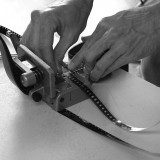8. One Compass to Rule Them All
March 17th 2020, Tuesday
Dear Blog,
Yesterday we had our first online class since the school got suspended for coronavirus. I think it was the first time that I was so acutely aware of just how much I do not like my class. I could have used that time to do some self-directed learning instead of just passively sitting there and listening to some poorly-put-together lectures that did not resonate with me at all.
“Passive learning creates knowledge. Active practice creates skill.”
— Scott Young. “Ultralearning.”
What I am missing is some practice. If I have to force myself to remember what I have learned in the past two weeks, I can only remember that one session in which we need to solve some real problems with some real numbers. Only then did all the things we covered in class became real. Only then did I feel that I was actually learning something.
That being said, looking back on last year, I have to say that I did not retain most of the knowledge that I have acquired during my studies. There are several reasons for that. I am telling myself that I only need to graduate to get a job in Germany, yet the difficulties in finding an internship have taught me that I need hard skills and not intellectual bullshit. I just want to find a job with minimum pay and work on my own projects. But I am also resenting the fact that I am halfway down with my twenties and I feel the need to take advantage of this magical time and do something with my life before everything begins to set in stone. What I lack is a consistent structure with a clear focus and goal in mind that can sustain me through this learning journey.
I am reading this book called Ultralearning by Scott Young and there are quite a few things that hit home for me. He mentioned his talk with Bobby Lewis, an Irishman who tried to be fluent in German in 3 months. Not just German. He is also fluent in French, Portuguese and conversational Czech after just a few weeks on a tourist visa. He had a rule of speaking from day one. Don’t worry about being perfect. Just start speaking.
I came to Berlin on September 30th, 2019 and spoke absolutely no German apart from ‘hello’, ‘goodbye’, and ‘nice to meet you’. On July 1st next year I took a B2 test at the Goethe Institute. I didn’t pass all the four parts, but I got a 91 out of 100 points for the oral exam and passed the listening section as well. Bear in mind I was also taking classes taught in English in another school as well. This whole thing just taught me that I don’t need years of studying German in order to speak it. In fact, I am in that stage where I am comfortable speaking German but not so comfortable reading or writing German. I suppose that is one of the fallouts of speaking from day one without a system. Your listening and speaking get really good, only to a degree before you get stuck again. Then you would need some systematic effort to move to the next level. But I did remember being very eager to learn and spent lots of time trying to figure out the IPA pronunciation of all the German consonants and vowels. I am stuck now because I got lazy. My school doesn’t really need German, and if you take away the stress hormones that I had when I first came here, you would have to use something else to sustain your effort. I think I am a very curious person. I am a subscriber of The Great Course Plus, Masterclass, and LinkedIn Learning, and I somehow proud myself in my diverse interests. But I almost always learn out of anxiety, out of the fact that my twenties are almost over and I have done nothing to show for it, that perhaps if I just accumulate more knowledge I would feel better about myself.
People mistakenly think that virtue lies in the knowledge of many things. What is important is not the quantity but the quality of knowledge.
— Leo Tolstoy

The most important knowledge is that which guides the way you lead your life. It is harmful to eat if you are not hungry. It is even worse to have sex if you lack desire. But even more harmful is to try to think when you do not wish to, or to be engaged in meaningless intellectual activity. Many people do so when they want to improve their position.
— Leo Tolstoy
A thought can advance your life in the right direction only when it answers questions which were asked by your soul. A thought which was first borrowed from someone else and then accepted by your mind and memory does not really much influence your life, and sometimes lead to you in the wrong direction.
— Leo Tolstoy
Read less, study less, but think more. Learn, both from your teachers and from the books which you read, only those things which you really need and which you really want to know.
— Leo Tolstoy
It’s time, Hanson. You have to define what knowledge is essential to you and what isn’t. You have been enslaved by your anxiety. Just like your pathological need to be liked by everyone. There will be people out there who just enjoy hating you. That is a fact of life. By the same logic, there will be things that you simply cannot achieve. You have to let go, free up the energy, so you can do what really matters to you.
There is this story of Warren Buffett that I read from another book.
“The story goes like this: Buffett turns to his faithful pilot and says that he must have dreams greater than flying Buffett around to where he needs to go. The pilot confesses that, yes, he does. And then Buffett takes him through three steps.
— Angela Duckworth. “Grit.”
First, you write down a list of twenty-five career goals.
Second, you do some soul-searching and circle the five highest-priority goals. Just five.
Third, you take a good hard look at the twenty goals you didn’t circle. These you avoid at all costs. They’re what distract you; they eat away time and energy, taking your eye from the goals that matter more.”

I would also say that conventional prioritizing isn’t enough. When you have to divide your actions among a number of very different high-level career goals, you’re extremely conflicted. You need one internal compass—not two, three, four, or five.












